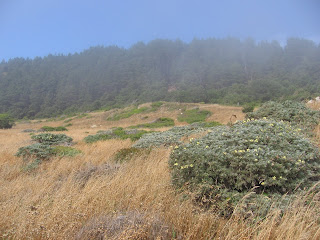Teach your children about the damage that can be done by putting foreign objects in their ears.
Help, quick, can we get an editor over hear?
Teach your children about the damage that can be done by putting foreign objects in their ears.
You may notice your dog scratching his ear or rubbing it on the floor or on a piece of furniture. That's a sign that he may have a yeast infection. You should check his ears for these signs: (2)
• Brown, yellow or bloody discharge that has a strong odor
• Redness or swelling
• Crusted skin on the near ear flap
• Loss of hair around the ear
• Head shaking or tilting
• Loss of balance
• Loss of hearing
• Walking in circles
• Unusual eye movements*********************
I suppose you could tell if the dog was walking in circles by watching its ears. And even the head shaking and tilting might be evident. But the unusual eye movements? I'm going to be watching my dog's ears this evening. I'll tell you later what they say about her eyes.



Those are some of the things I do. There is more, but the point is even a little bit can make a difference, especially if that little bit makes me more aware of what more I can do. Each one of us needs to look at what we do, and then do what we can to make a difference.
Nearly one in every four women are beaten or raped by a partner during adulthood. 1 in 6 women and 1 in 33 men have experienced an attempted or completed rape. Three women are killed by a current or former intimate partner each day in America, on average.
Domestic Violence and Sexual Assault Fact Sheet
The National Network to End Domestic Violence
Please, if you are in an abusive situation, tell someone and ask for help. And if you know someone who is being abused, don't remain silent. Reach out and help. In the United States call the National Domestic Violence Hotline at (800) 799-SAFE (7233) or TTY (800) 787-3224.
Internationally, The Broken Spirits Network maintains a database with contact information for organizations around the world that can intervene, provide support, and help stop cycles of abuse. You can find the directory here.



It’s hard to imagine I’ll ever be satisfied. But I can still keep working.
I sat down beside her. “You liked Pop did you?”
“Very much. It doesn’t seem fair, Jason, that he died so soon after I met him. I danced with him at Howard’s and Mother’s wedding. I was so nervous when he asked me because they were playing a waltz and I was so sure I was going to step on his feet. But he made it easy. I didn’t even have to think about what I was doing. He made it feel like magic.”
“Pop was a good dancer. I can remember when I was little watching him and my mother dance together in our living room. I also remember when they used to go to square dances. He’d wear a cowboy hat and she’d wear this big flared skirt with all these layers of petticoats underneath it.”
“You wrote about that,” Candi said. “’My Mother’s Petticoats.’ It was in your first book. How she would swirl in front of you, fanning you with her skirt and being dissolved in a cyclone of lace.”
I felt humbled. I had actually forgotten that I’d included that poem in my first collection. “You really do know my work better than I do, don’t you?”
“I’m sorry,” she said. “Did I get it wrong?”
“No. No. You got it just right. I’m surprised, that’s all. I wish I could remember my work as well as you seem to.”
“I like that poem a lot. The way you describe the air moving so fast around you and you stayed still as a stone, and then how your mother wasn’t even there. Nothing but the moving air and you felt left behind. I kind of know what that feels like. Everybody just comes into your life and goes and it’s like they were never there at all. And if the air didn’t move, you would never know it.” She had it just the way I had meant it when I wrote it. “Aunt Margaret was your mother’s sister?” she asked.
“Yes.”
Well, I'm looking at it right now, and I've asked repeatedly for details. So far it's been nothing but mute.Complimentary
High Speed Internet Access
And Remote Printing
See your desk drawer for details.
For some expectant moms, even the slightest ache or pain can trigger a five-star alarm and trip to the doctor, but other pregnant women may well ignore a potentially serious warning sign because they think it is a normal part of pregnancy or they fear of being the girl who cried wolf.This is from a professional writer with an impressive list of credits, including Woman’s World magazine, Arthritis Today, and the Wall Street Journal. The writer has a graduate degree in journalism, and has won awards for online reporting. I can only assume the writer was having a bad day. (Actually, what I really assumed is that the writer is used to having her work very heavily edited and simply doesn't care.)
For some expectant moms, the slightest ache or pain triggers a major alarm and a trip to the doctor’s office. But other pregnant women sometimes ignore a potentially serious warning sign. They may think it’s a normal part of pregnancy. Or they may simply not want to be seen as the girl who cried wolf.
Annual Percentage Rate for Variable Rate Accounts
The index for your account is changing from the Prime Rate. The new index will be the highest three month LIBOR (London Interbank Offer Rate) published in the northeastern edition of The Wall Street Journal in its Money Rates table at any time within the immediately preceding three months, including the month in which the index was determined, rounded up to the nearest one-quarter of a percentage point. As of July 1, 2009, your Margin would be the number of percentage points plus the index which would give you the same APR you now have on Purchases and Balance Transfers. This change is effective on the first day of your billing cycle that begins in April 2010.
Guaranteed GasolineAs opposed to what? Milk and honey? Everyone knows cars won't run on milk and honey.
World Science Festival 2009: Bobby McFerrin Demonstrates the Power of the Pentatonic Scale from World Science Festival on Vimeo.
Galli's Sanitary BakeryI don't even want to guess what that means.
Hardwork must have killed someone.
An adult dog's diet can contain up to 50% carbohydrates, including 2.5% to 4.5% fiber, according to the National Research Council, a scientific research unit of the nonprofit National Academies.
An adult dog's diet can contain up to 50% carbohydrates, including 2.5% to 4.5% fiber.

I found your post interesting... though I am no expert, I have done a fair amount of studying on the role of poetry and journal writing (I call it personal writing), in the development of the self. In my research I have found there are many reasons persons write... and yet too some of the poetic musings you discuss are related to semantics and syntax. Yet too, for many, poetry is merely an exploration and expression of self that leads to a transcendent place. Common themes I have found are the personal exploration and creation of selfhood through the personal writing. So perhaps part of all of this relates to the writer, the skill, and the purpose by which it is written? I'd appreciate your thoughts..
I think the points she makes are really good. Having taught writing for more than 20 years before becoming a full-time freelancer and having continued over the years by developing new writers as an editor and teaching as an adjunct faculty member, I'm well aware of the role writing plays in self discovery and development. And as a poet, I know the power of exploring poetic expression. One way we create and discover new knowledge is through metaphor, and metaphor is at the very heart of poetic expression.
I know that many people use poetry to both "explore" and "express" self. And there is a very long history and strong tradition of poetry being used in multiple settings as a form of therapy. And whether someone uses poetry as a form of private journaling or in a more formal therapeutic way, there is nothing "mere" (in the sense of limiting or simple) about the act. And anything that helps us achieve some level of transcendence is certainly outside the critical arena I intended that earlier post enter.
But we need to make distinctions. Poetry written as part of a therapeutic program and the lines and metaphors that you and I and millions of other people all over the world scribble into our journals at the end of a day or while sitting with a cup of tea in a coffee shop is not the same as poetry printed or posted on line in literary journals and zines or as poetry in even more mainstream publications. Poems in journals and poems that come out of a course of treatment are private poems. They are not and should not be subject to the same rules and expectations that poems presented as art are subject to. That doesn't mean that poems written in journals and written as therapy can't also be artistic and good. Some are excellent examples of the poetic art. But poems written for publication and for an audience are by definition an art form and can be expected to do certain things. There is a tradition they belong to. There is an ancient history of poetry as art and a history of theory just as ancient. Somehow the poems that are presented as art must carve out their place within that tradition or fall by the wayside. Those were the poems and that was the poetry I was referring to last Monday.